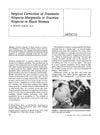Traction Alopecia: 2% Topical Minoxidil Shows Promise. Report of Two Cases
December 2006
in “
Journal of The European Academy of Dermatology and Venereology
”

TLDR Minoxidil helps hair regrowth in traction alopecia.
This report discusses two cases of traction alopecia, a type of hair loss caused by hairstyles that pull on the hair, that were treated with 2% topical minoxidil. Both patients had longstanding traction alopecia that did not improve after stopping the hairstyles causing the condition. However, after using topical minoxidil for several months, both patients experienced new hair growth. The report suggests that follicle miniaturization may be a pathogenic process in traction alopecia and that further research is needed to better understand the mechanisms behind the condition. The report also notes that medical treatment is preferable to surgery for traction alopecia.









